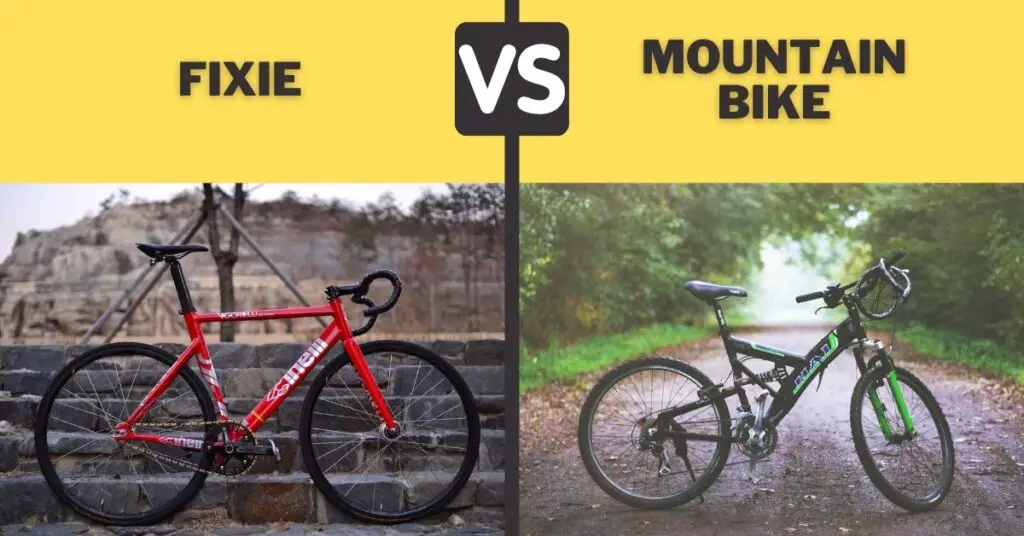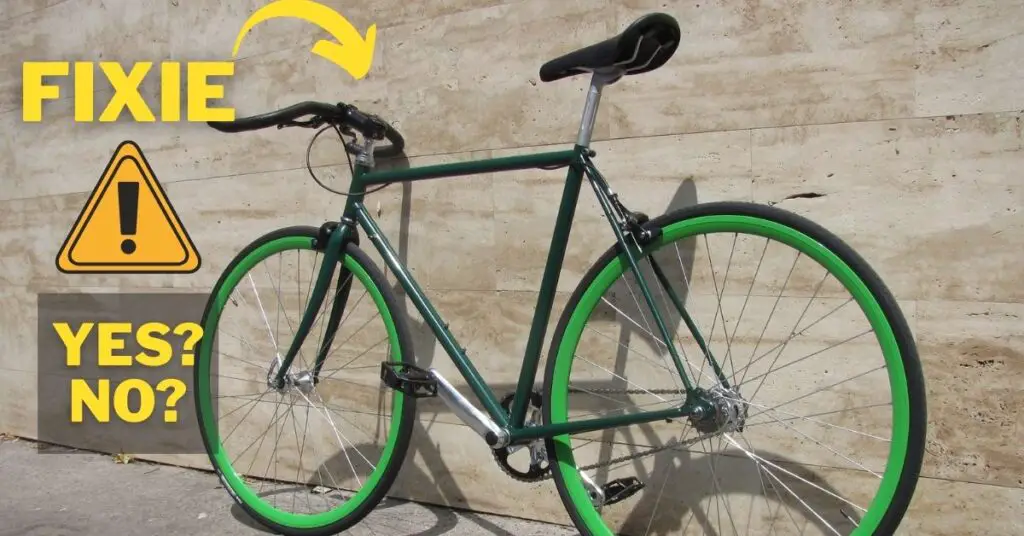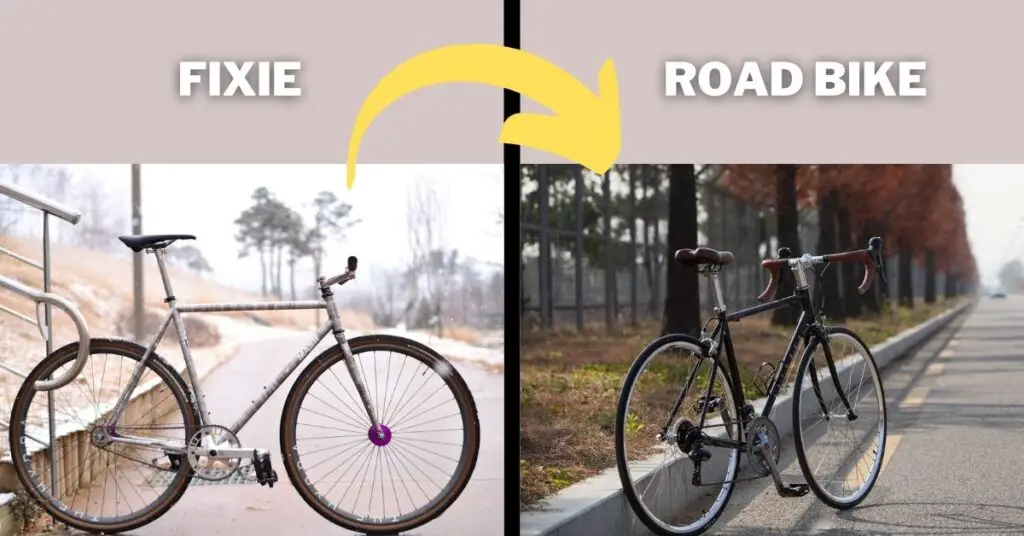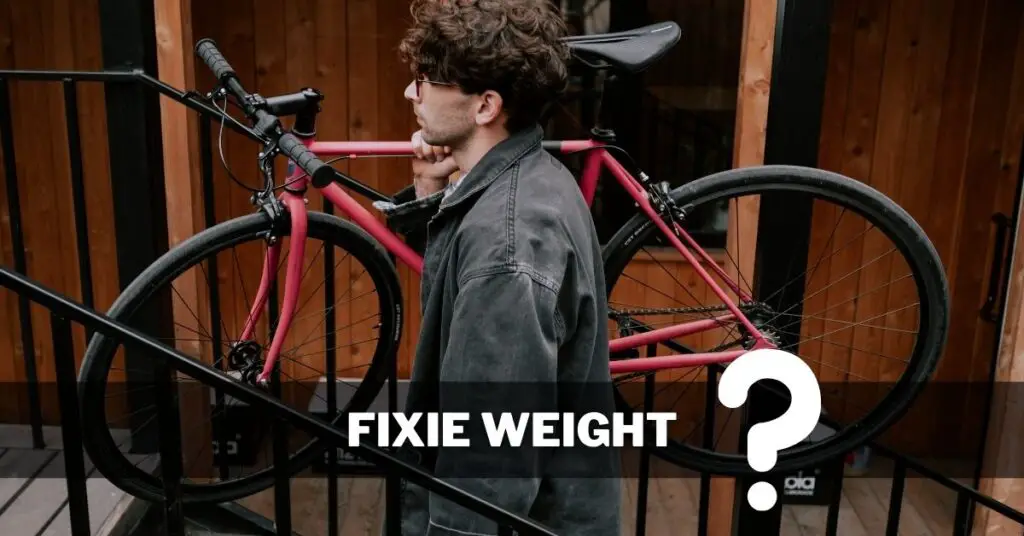Fixed gear (fixie) bikes and mountain bikes are two very popular types of bicycles, especially among youth, and in selecting the right bicycle for yourself, it is inevitable that you will consider the speed of these two bikes, and select one with a speed that suits your needs.
Both these bikes have distinct designs, structures, and components, which alongside several other factors, contribute to the speed the bicycles can reasonably attain.
So read on to see our analysis of these two bikes and the determination of which has faster speeds.

Are Fixies Faster than Mountain Bikes?
The simple answer is yes, fixed gear bikes are faster than mountain bikes. The average miles per hour (mph) of a fixie is 15 to 20 mph while that of a mountain bike is 10 to 12 mph. There are several factors that push the fixie to greater speed, ranging from the structure of the bike to the design of the tires, weight, the surface being ridden, and more.
What Makes a Fixie Faster Than a Mountain Bike (4 Reasons)
Like I said earlier, there are several factors that contribute to the higher speed of a fixed gear bike as opposed to that of a mountain bike. Here are some of these factors and a simple explanation as to why they make the fixie faster;
1- Weight
Fixie bikes are simple in structure and weigh about 8-9kg. They do not have the complex gear parts such as the cables, freewheel hub, shifters, chainrings, etc that can be found on a mountain bike.
This lifts off three to five pounds from a fixed gear bike, and while this may seem small, it gives an advantage to the fixed gear that helps it accelerate faster than a mountain bike.
2- Design of the Bike
The design of fixed-gear bicycles makes it easier for them to accelerate faster than a mountain bike. The body frame of the bicycle has an aerodynamic profile that allows it to glide through the air easily and more smoothly than the thicker frame of a mountain bike.
3- The Tire Structure
The tires of a fixed gear bike are slim and smooth. This reduces the road resistance of the tires as opposed to the thicker wheels of a mountain bike which have knobbly tires and grooves that allows it to ride through rough roads easily.
4- Energy & Efficiency
The drivetrain of a fixed-gear bike is more mechanically efficient than the drivetrain of any other bicycle. It allows a higher transfer of direct power from the pedaling of the rider to the movement of the wheels than in any other type of bicycle.
This reduces the amount of energy required to move a fixie in any given gear, as opposed to a mountain bike which has a less efficient drive train and requires more energy for all its gears.
How Fast Is a Fixie (Fixed Gear Bike)?
There are several important variables that determine what the average speed of a fixed gear bike will be. Some of these variables include the gear ratio, wheel diameter, the design of the bike, etc.
A very important variable is the rider, as the energy and power exerted in cycling can push the bike to higher speeds, although this is not very safe.
The gear ratio of a fixie is determined through a division of the teeth in the chainring by the teeth in the sprocket. It tells us how many times the wheel of your bike will spin as you pedal on the road.
A common gear setting on multi-speed bikes like a fixed gear is 4.55, this will give us a max speed of 32.8 mph, which shows just how fast a fixie can go.
This can increase to as high as 40 mph when the bike is going down a decline such as cycling down a road decline, however, this is not recommended as high speeds on downward slopes can be hard to control and dangerous.
Average Speed Comparison between a Fixie & Mountain Bike
In comparing the average speed between a fixed gear bike and a mountain bike, it is important to examine which bike has more speed on different types of roads. So, let us assume we have the same cyclist, who is in peak physical condition and riding these two bicycles under the same circumstances
Here is a table analyzing the speeds of a fixed gear bike and mountain bike attained by such a cyclist on three different road types……
| Terrain | Fixed gear Bicycles | Mountain Bicycles |
| Flat Uphill | 12-14 mph | 8-10 mph |
| Flat declines | 35-40 mph | 31-37 mph |
| Flatground | 15-20 mph | 10-12 mph |
| Rough terrains | 12-14 mph | 18-20 mph |
An analysis of the average speeds on these various terrains shows that a fixie bicycle is faster than a mountain bike on three surfaces while the mountain bike has the advantage on rough and rocky terrains.
This is because the tires of a mountain bike are specifically adapted to riding on roads that are rocky such as hills and mountains.
Which Is Better for Every Day Commuting? Fixie or Mountain Bike?
As the name implies, mountain bikes are more suited to rugged and rough terrains, especially uphill rough terrains like hills and mountain reserves.
I do not recommend mountain bikes for the everyday commute as it is heavy, slow on the tarmac, and more suited to leisure riding or exploration on off-road terrains.
On the other hand, here are five reasons why a fixed gear bike is the better option for your everyday commute……
1- Fixies are very simple bikes. They do not have many parts or complexities in their structure. This reduces the likelihood of damage and the necessity of repair and replacement of bicycle parts.
2- As earlier established, fixies are very fast bikes. They are commonly used in several countries like France and Italy by courier services.
3- Fixed gear bikes do not have a freewheel function which means that you need to keep peddling to keep your bike moving. This creates an added benefit of fat loss and building muscle over time.
4- Ease of maintenance is a great element of fixies. The parts most likely to suffer damage or require replacement such as the wheel or spokes are cheap, easy to find, and easy to replace. The bikes themselves are also very affordable to buy.
5- The lightweight design of fixed-gear bicycles is very key. They generally weigh 3 or 4 pounds less than other types of bicycles. This counts in long-distance commute, making it more comfortable to ride and making it easy to maneuver and control in traffic and on city roads.
General Pros and Cons of Fixed Gear & Mountain Bikes
There are other important factors to consider when choosing a bike apart from the speed, so here and some pros and cons to both bicycles.
FIXED GEAR BIKES
| Pros | Cons |
| The bicycle is light in weight with a slim frame | Requires skill and practice |
| Simple to handle and maneuver | Difficult to use on rough terrains |
| Great for everyday commute in busy places | Cannot stop pedaling or the bike will stop |
| Can attain high speeds | |
| Affordable and requires a minimal maintenance cost |
MOUNTAIN BIKES
| Pros | Cons |
| Great for riding on rough terrains and rocky surfaces | The bicycle is heavy with a thick frame |
| Has an upright position which makes it easy to ride | Slow to ride on tarmac |
| Versatile and easy to adapt for various surfaces | Requires more maintenance |
Conclusion
Both bikes are undeniably very good in their regard but when it comes to speed, the numbers do not lie. With the exception of rough and rocky terrains (which is the specialized purpose of mountain bikes), fixed-gear bikes are faster.
They are also preferable for everyday commute on tarred roads such as in the city, and for fast/urgent commutes and errands such as courier cyclists.
On the other hand, if you live in an area with rough terrains, prefer slower speeds, or want to go on an off-road adventure, then a mountain bike is the best bike for you. Or, you can get them both and experience the best of both worlds.




